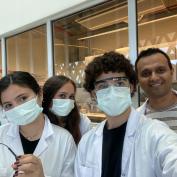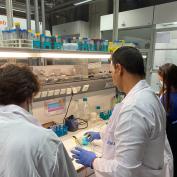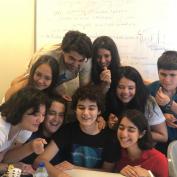What is “Asian Science Camp”?
- The idea of Asian Science Camp was first suggested by Professor Yuan-Tseh Lee and Professor Masatoshi Koshiba (the 2002 Nobel Laureate in Physics) in September 2005 after the 55th Lindau Science Meeting in Germany (the 1986 Nobel Laureate in Chemistry).
- The Asian Science Camp provides a platform for dialogue and discussion amongst promising talented youth and invited Nobel Laureates and Eminent Scientists. It also helps to develop international friendship and cooperation among next generation Asian young scientists.
Asian Science Camp Program Features
- Around 300 students aged between 17-22 from approximately 30 different Asian countries are invited to the ASC, students have strong proficiency in oral and written English along with a genuine interest in Science.
- Young Asian scientists participate and discuss the Nobel laureates' lectures for a week.
Asian Science Camps consist of:
- Lectures and discussions by Nobel laureates and renowned scholars
- Poster session by participating students.
Host countries since 2007 are listed below;
Click to see Turkish Delegates since 2015.
Team Leader: Sabancı University Materials Science and Engineering PhD Student Ebru Çetin
- Alara Sayar - Çakır High School
- Bora Menderes - Nazilli Science High School
- Eren Umay - Robert College
- Eylül Ustaoğlu – Üsküdar American Academy
- Onur Yiğit Taş –İstek Kemal Atatürk High School
- Ömer Eren Koçyiğit – Hekimoğlu High School
- Senem Dila Yılmaz - FMV Işık High School
- Zeynep Gülse Aydın - Sainte Pulchérie High School
Team Leader: Sabancı University Materials Science and Engineering Phd Student Melike Nur Önder
- Doğaç Enginsu Kon - Private Kocaeli Bahçeşehir IB High School
- Elif Pehlivanlı - Ankara Science High School
- Umut Ölmez - Hisar School
- Güneş Şarsel - Üsküdar American Academy
- İsmail Cem Cidem - Galatasaray High School
Team Leader: Sabancı University Physics Masters Student Deniz Boz
- Selin Öz - Hisar School
- Feray Ok - Koç High School
- Mert Kaan Denizciler - Koç High School
- Ekin Seçilmiş – Galatasaray High School
- Tuğçe Er - Adapazarı ENKA Schools
Team Leader: Sabancı University Materials Science and Engineering Masters Student İpeknaz Özden
- Ecem Sönmez- Hisar School
- Hazal Sabiha Ergelen - TEVİTÖL
- Selin Kolsuz - TEVİTÖL
- Sema Alara Değirmenci - Robert College
- Sıla Beyda Bekiroğlu - Saint Joseph High School
Team Leader: Sabancı University Materials Science and Engineering PhD Student Aysu Yurduşen
- Ongun Uzay Macar - Robert College
- Simay Yazıcıoğlu- Robert College
- Melisa Yıldırım- İzmir Science High School
- Umut Eren Usturalı - İzmir Science High School
- Sinan Rasim Onukar - Saint Joseph High School
- Cansel Canaz- Adapazarı ENKA Schools
- Seçkin Yaşar - Ankara Science High School
Team Leader: Getronagan Armenian High School Physics Teacher Yester Özmerinoğlu
- Ekin Böke - Ankara Science High School
- Elif Nur Ulusoy - Adapazarı ENKA Schools
- Emre Mert İpekoğlu - Middle East Technical University
- Gizem Dal – Saint Joseph High School
- Güner Ali Yenal - Hisar Schools
- Hakan Dingenç - TEVİTÖL
- Hasan Selçuk Özcan - İzmir Science High School
- Nihal Irmak Pakiş - Robert College
previous ASCs:
- Singapore / Nanyang (August 24th-30th, 2014)
- Japan / Tsukuba (August 25th-30th, 2013)
- Israel / Jerusalem (August 26th-30th, 2012)
- South Korea / Daejeon (August 7th-13th, 2011)
- India / Mumbai (August 17th-22nd, 2010)
- Japan / Tsukuba (August 2nd-8th, 2009)
- Indonesia / Bali (August 3rd-9th, 2008)
- Taiwan / Taipei (August 5th-11th, 2007)
The Role of Sabancı University in ASC
- Since the first enrollment of Turkish Delegates to the ASC in 2007, Sabancı University Foundations Development Directorate carries out the selection of the Turkish Delegation organizes the participation.
- We put effort in announcing the event among Turkish High Schools in order to increase diversity.
- Sabancı University scholars select the delegation rigorously among the applicants.
- Delegation is supported in terms of content and technical issues, and participation to the camp with an accompanying team leader assigned by Sabancı University Foundations Development Directorate.
Applications
- Each year, upon receiving the invitation from the host country, we announce the call for applications to ASC to high schools.
- Applicants must demonstrate strong proficiency in oral and written English, a genuine interest in science, and excellent teamwork skills.
- Written applications are carefully reviewed, and shortlisted candidates are invited for an interview.
- For convenience, online interviews are conducted with the selected applicants. Based on these evaluations, a delegation—typically consisting of six members—is chosen by our academic team and announced.
- The number of delegates permitted for each country is determined and communicated by the host country.
Asian Science Camps were suspended in 2020 and 2021 due to COVID-19 pandemic. The Turkish Delegation attended the camp held in South Korea in 2022 as online from the Sabancı University Campus. Our delegation's poster was chosen as the best poster of ASC 2022 among 35 posters, 24 countries, 200 participants.
The flight ticket and visa costs of the students selected for the Asian Science Camp are covered by the students themselves. The Asian Science Camp host country covers the meal and accommodation expenses of the students during the camp.
Click for the gazeteSU article: "Asian Science Camp Continues on Sabancı University Campus"
Photo Gallery: Asian Science Camp 2022


